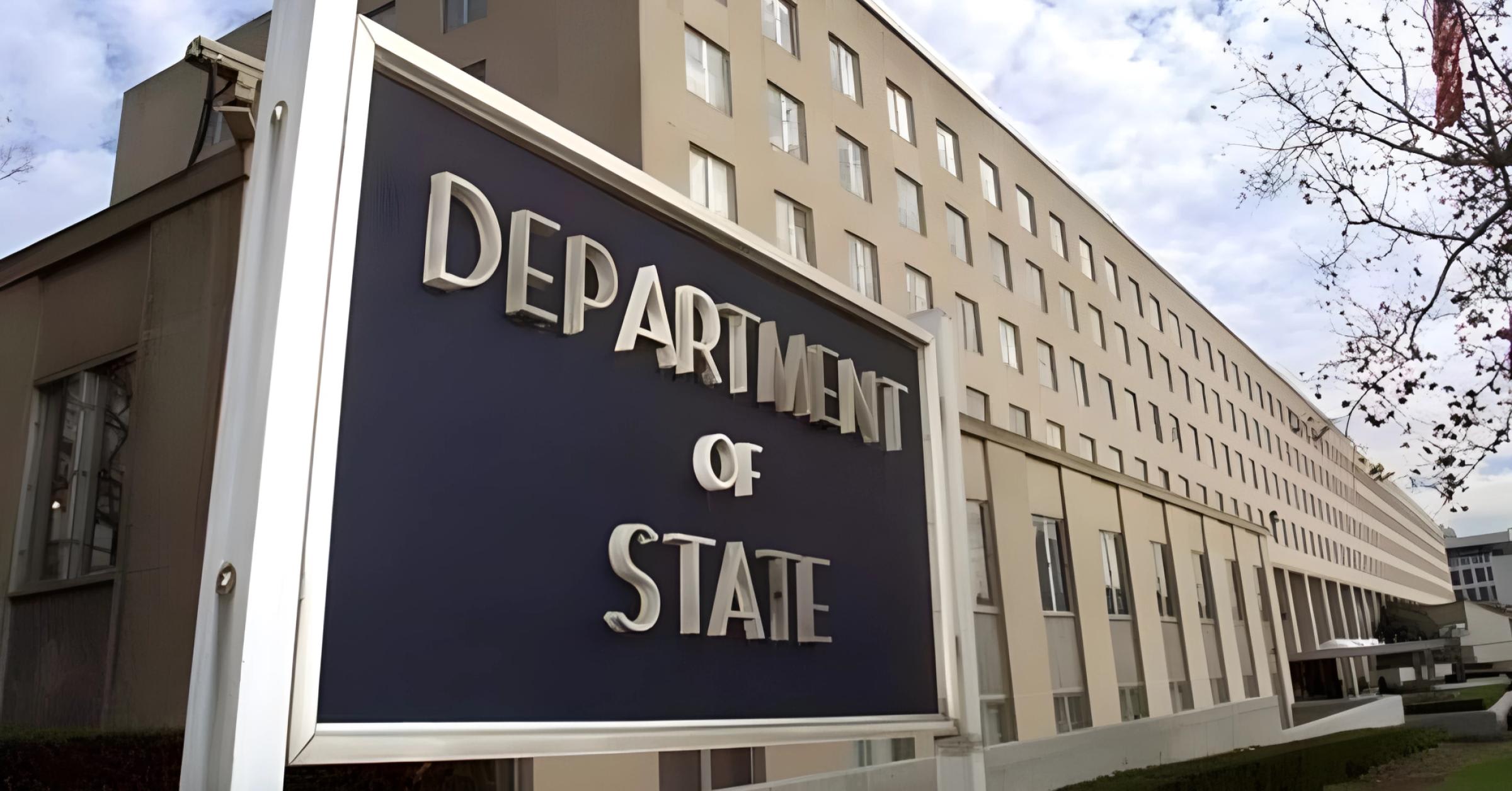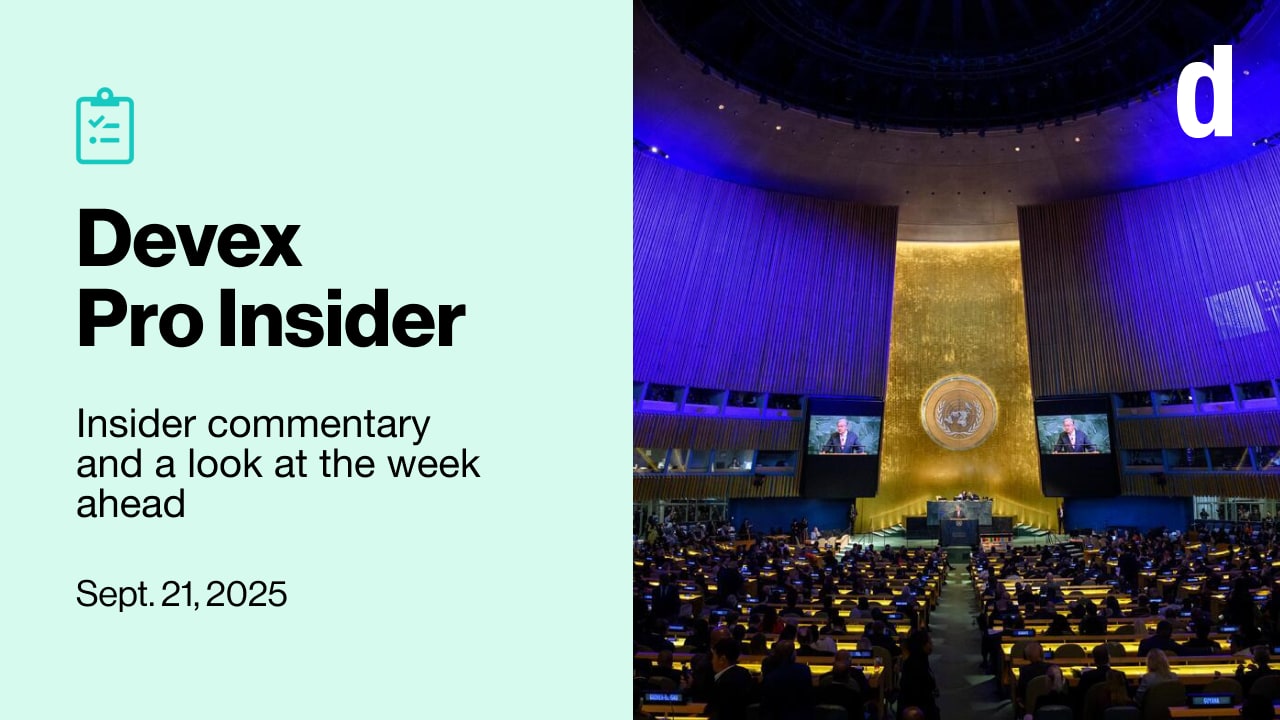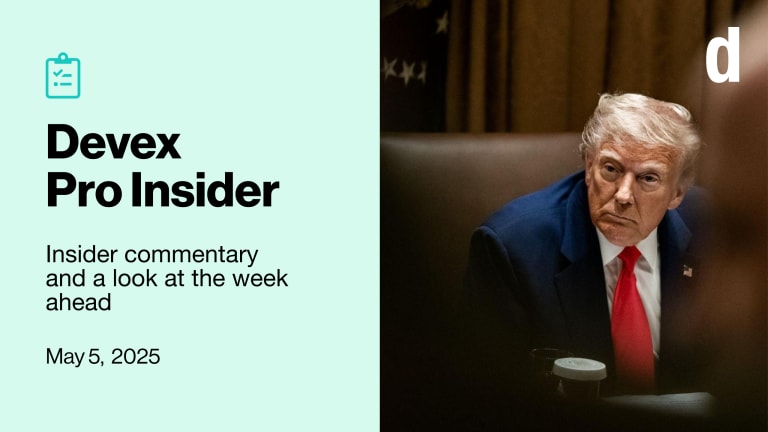Devex Pro Insider: Trump anxiety hits philanthropy — and the WTO?
A veteran development finance chief reflects on what’s to come, and USAID pursues value for money.
Since the evening of Nov. 5, a lot of people have been trying to figure out what the reelection of Donald Trump might mean for their work. And none more so than those in the field of philanthropy. While you might imagine that Trump is in favor of private funding for charitable projects, to reduce the burden on the state, he implemented tax changes that disincentivized charitable giving during his last term. Moreover, his Vice President-elect JD Vance has described private foundations as “cancers on American society” and suggested that their assets be seized. We set out to learn how those working in philanthropy are feeling, what they’re expecting from Trump, and how they’re preparing. Such is the anxiety that the 12 major foundations we approached wouldn’t speak to us. However, here’s what we learned from those who would. Coming up: Join us for our final Devex Pro Live event of the year! In this special leader roundtable, we’ll be speaking to executives from across the global development sector to discuss what they learned in 2024 and how they’re preparing for the challenges ahead in 2025. Also in today’s edition: The Trump effect hits WTO, a veteran development finance chief reflects on what’s to come, and USAID pursues value for money. Bits and pieces In a hurry? Former Nigerian finance minister Ngozi Okonjo-Iweala was reappointed for a second four-year term as director-general of the World Trade Organization last week. At a press conference afterward, WTO officials brushed off suggestions that the appointment had been rushed through ahead of Trump’s inauguration, although it certainly looked that way to many. Okonjo-Iweala had strong support and ran for reappointment uncontested, but the previous Trump administration had tried to block her initial appointment and accused her of being an ally of China — in part because she has advocated for a fairer deal for low-income countries in the international trade system. Okonjo-Iweala said diplomatically last week that she was “looking forward to working with the new administration” but there are of course concerns about Trump’s plans to implement tariffs and his historic hostility to WTO, which wants to reduce barriers to trade. Good BII. Last week, Nick O’Donohoe left British International Investment after more than seven years at the helm of the U.K.’s development finance institution. It’s undergone some significant changes during that time — including a rebrand (it was previously known as CDC), a new strategy, and a budget boost. O’Donohoe wrote some reflections on his final day — and he touched on some of the key controversies surrounding the growth of DFIs. First, there is the question of development finance being diverted to the climate cause. Governments are “quite rightly” looking to DFIs and multilateral development banks to finance the climate transition, he wrote. However, it creates a challenge because while the greatest capital needs for development are in low-income countries, the greatest capital needs for the climate transition will be in middle-income countries. “Governments need to ensure that the funding for climate does not come at the expense of tackling the SDGs,” he warned. “The pie needs to grow not simply get redivided. That must be at the core of any MDB and DFI reform.” Another criticism thrown at DFIs in recent years is that they have been playing it safe — investing in lower-risk projects and environments where the returns are more secure while overlooking the highest-risk investments that could really have an impact. O’Donohoe seems to agree. “In a rapidly developing world, our focus needs to remain squarely on the poorest countries and ideally in providing the riskiest form of capital, equity, in those countries,” he wrote. Development finance should move out of countries where local capital is already substantial, except where it is supporting something “new and unproven,” he added. Spend to save. Speaking of impact, the Center for Effective Global Action at UC Berkeley is leading a project on how to improve the cost-effectiveness of USAID’s work. It’s a major $75 million, five-year partnership, commissioned by USAID and bringing together several research institutions. But the hope is that it will save money in the long term by providing evidence on what’s working and how USAID can achieve the biggest impact per dollar. There’ll be an emphasis on randomized control trials — the Abdul Latif Jameel Poverty Action Lab, which popularized this approach within global development, is a partner in the project. Apart from academic institutions, there are also several INGOs taking part, including Save the Children, Mercy Corps and the International Rescue Committee. In a press release, IRC noted that this approach could “set an example” for aid agencies facing constrained budgets and overlapping crises. And perhaps it’ll be appreciated by the incoming U.S. administration, with their efficiency focus. … ✉️ Do you have insights into any of this week’s bits and pieces? Let me know by replying to this email. Moving on Two weeks ago, I reported that Roman Napoli was departing USAID, where he served as deputy assistant administrator. Now we know why — he’s started as chief financial officer at the U.S. Agency for Global Media. Landry Tsague Dongmo was named as the new director for primary health care at Africa CDC. Shingai Machingaidze is now head of Africa strategy and engagement at CEPI. Cristina Stefan is the new head of advisory at the Centre for Disaster Protection. Humanity & Inclusion has welcomed Hannah Guedenet as its new U.S. executive director. Did we miss one? Is there a change on the horizon? Let us know at devexpro@devex.com. Up next Climate justice. This is an interesting one — the International Court of Justice is holding hearings to clarify states’ obligations when it comes to climate change. It comes after the U.N. General Assembly asked the ICJ to offer an advisory opinion on whether states are obliged under international law to protect the world and its residents from greenhouse gas emissions. Whatever conclusion the court comes to could influence multilateral processes around climate and help to establish a legal framework to hold states accountable. Dec. 2-13. Building Bridges. The fifth edition of Building Bridges, the sustainable finance summit, is taking place in Geneva. They’ll be talking about the Bridgetown Initiative, transition finance, and more. My colleague Jesse Chase-Lubitz will be covering the event — you can reach her at jesse.chaselubitz@devex.com. Also taking place on the sidelines is the UN Environment Programme Finance Initiative’s global roundtable. The biennial event is focused on setting and implementing targets for the financial industry in areas such as pollution and human rights. Dec. 9-12. Climate envoy. Finally, ODI Global is hosting a conversation with Rachel Kyte, the U.K.’s new climate envoy. They’ll be discussing the outcomes of COP29 and what to expect at next year’s COP30, as well as U.K. action on climate change at home and abroad. Dec. 10.
Since the evening of Nov. 5, a lot of people have been trying to figure out what the reelection of Donald Trump might mean for their work. And none more so than those in the field of philanthropy. While you might imagine that Trump is in favor of private funding for charitable projects, to reduce the burden on the state, he implemented tax changes that disincentivized charitable giving during his last term. Moreover, his Vice President-elect JD Vance has described private foundations as “cancers on American society” and suggested that their assets be seized.
We set out to learn how those working in philanthropy are feeling, what they’re expecting from Trump, and how they’re preparing. Such is the anxiety that the 12 major foundations we approached wouldn’t speak to us. However, here’s what we learned from those who would.
Coming up: Join us for our final Devex Pro Live event of the year! In this special leader roundtable, we’ll be speaking to executives from across the global development sector to discuss what they learned in 2024 and how they’re preparing for the challenges ahead in 2025.
This story is forDevex Promembers
Unlock this story now with a 15-day free trial of Devex Pro.
With a Devex Pro subscription you'll get access to deeper analysis and exclusive insights from our reporters and analysts.
Start my free trialRequest a group subscription Printing articles to share with others is a breach of our terms and conditions and copyright policy. Please use the sharing options on the left side of the article. Devex Pro members may share up to 10 articles per month using the Pro share tool ( ).
Jessica Abrahams is a former editor of Devex Pro. She helped to oversee news, features, data analysis, events, and newsletters for Devex Pro members. Before that, she served as deputy news editor and as an associate editor, with a particular focus on Europe. She has also worked as a writer, researcher, and editor for Prospect magazine, The Telegraph, and Bloomberg News, among other outlets. Based in London, Jessica holds graduate degrees in journalism from City University London and in international relations from Institut Barcelona d’Estudis Internacionals.








